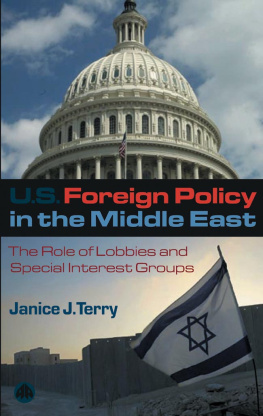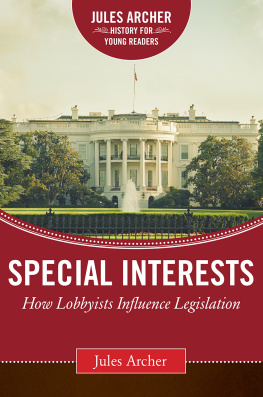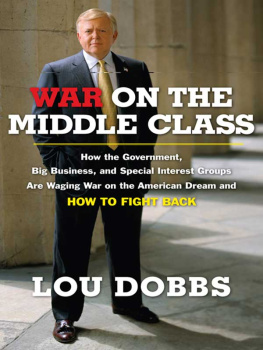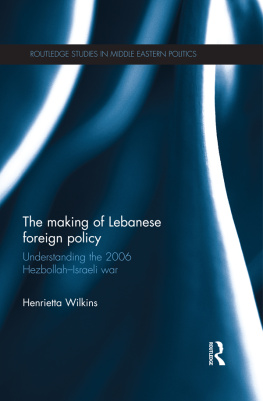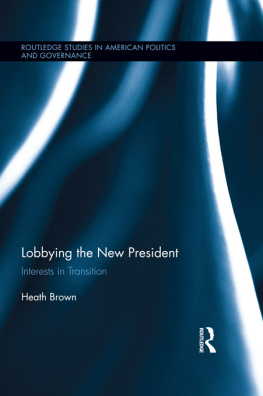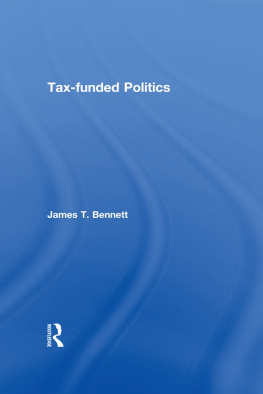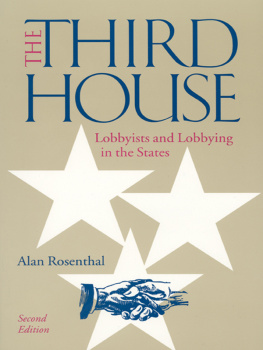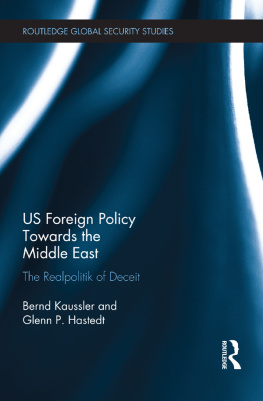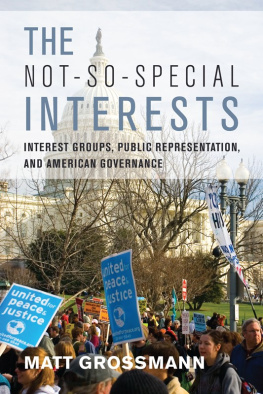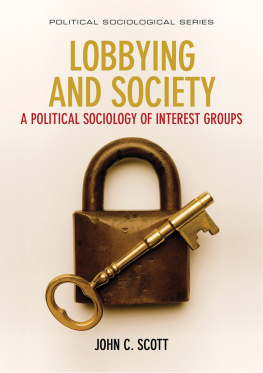U.S. Foreign Policy
in the Middle East
The Role of Lobbies and
Special Interest Groups
Janice J. Terry
First published 2005 by Pluto Press
345 Archway Road, London N6 5AA
and 839 Greene Street, Ann Arbor, MI 48106
www.plutobooks.com
Copyright Janice J. Terry 2005
The right Janice J. Terry to be identified as the author of this work has been asserted by her in accordance with the Copyright, Designs and Patents Act 1988.
British Library Cataloguing in Publication Data
A catalogue record for this book is available from the British Library
ISBN 0 7453 2259 X hardback
ISBN 0 7453 2258 1 paperback
ISBN 978 1 7837 1959 4 EPUB eBook
ISBN 978 1 7837 1960 0 Kindle eBook
Library of Congress Cataloging in Publication Data applied for
10 9 8 7 6 5 4 3 2 1
Designed and produced for Pluto Press by
Chase Publishing Services Ltd, Fortescue, Sidmouth, EX10 9QG, England
Typeset from disk by Stanford DTP Services, Northampton, England
Printed and bound in Canada by Transcontinental Printing
Contents
Acknowledgements
Many people and institutions contributed to making this book a reality. The Gerald Ford and Jimmy Carter Presidential Libraries and their outstanding staffs were unfailingly helpful and forthcoming with suggestions for further avenues of research and documentation. At the Ford and Carter Presidential Libraries particular thanks go to Drs. Don W. Wilson, David A. Horrocks and Dr. Don Schewe, Director, and archivist, Dr. James A. Yancey, Jr., respectively. Eastern Michigan University granted Faculty Research Leaves and a Sabbatical from teaching to provide the blocks of time necessary for research and writing. Dr. Gersham Nelson, Head of the EMU History and Philosophy Department, also encouraged the project. I am also grateful for a Grant-in-Aid award from the Rockefeller Archive Center to conduct research in their extensive holdings.
The late Egyptian diplomat, Tahseen Basheer, provided an overview into Arab responses to U.S. policies as well as introducing me to a very wide range of professionals involved in influencing foreign policy. A generation of scholars and journalists owe him a profound debt of gratitude for his assistance and direction. Ambassador Clovis Maksoud was similarly generous in sharing his vast knowledge and experience in the fields of diplomacy and foreign policy. Many other individuals involved with lobbies and pressure groups shared their inside knowledge and perceptions, but preferred to speak off the record.
Sally Marks is one of the main angels who persistently, but ever so gently, prodded me to complete the research and to synthesize the material into what hopefully is a cogent whole. However, all errors are mine alone. A round of applause is owing to Roger van Zwanenberg and Rebecca Wise of Pluto Press for their suggestions and editorial advice and to Martha Wade of Wade Management for her knowledge of all things musical. Finally, a standing ovation goes to Donald Burke, who is simply the best.
Abbreviations and Acronyms
| AAI | Arab American Institute |
| AARP | American Association of Retired Persons |
| AAUG | Association of Arab American University Graduates |
| ADC | American-Arab Anti-Discrimination Committee |
| ADCRI | Anti-Discrimination Committee Research Institute |
| ADL | Anti-Defamation League |
| AEI | American Enterprise Institute |
| AFSC | American Friends Service Committee |
| AHEPA | American Hellenic Educational Progressive |
| Association |
| AHI | American Hellenic Institute |
| AIPAC | American Israel Public Affairs Committee |
| ATFP | American Task Force on Palestine |
| AWACS | Airborne Warning and Control System |
| AZEC | American Zionist Emergency Council |
| CAIR | Council on American Islamic Relations |
| D-North Dakota | Democrat North Dakota, etc. |
| GFL | Gerald Ford Library |
| IRMEP | Institute for Research: Middle Eastern Policy |
| JCL | Jimmy Carter Library |
| JDL | Jewish Defense League |
| LBJ | Lyndon Baines Johnson |
| Memri | Middle East Media Research Institute |
| MERIP | Middle East Research and Information Project |
| MESA | Middle East Studies Association |
| MPAC | Muslim Public Affairs Council |
| NAAA | National Association of Arab-Americans |
| NSC | National Security Council |
| OPEC | Organisation of Petroleum Exporting Countries |
| PACs | Political Action Committees |
| PHRC | Palestine Human Rights Campaign |
| PLO | Palestine Liberation Organization |
| R-Cal | Republican California, etc. |
| R&D | Research and Development |
| Rep. D. | Representative Democrat |
| TRNC | Turkish Republic of North Cyprus |
| UHAC | United Hellenic American Congress |
| UJA | United Jewish Appeal |
| WINEP | Washington Institute for Near East Policy |
| ZOA | Zionist Organization of America |
Introduction
How does Washington decide upon and implement its foreign policy in the Middle East? What domestic and international factors are taken into consideration before decisions are made and put into practice? These questions have been hotly debated among experts and have befuddled much of the U.S. public for decades. In the aftermath of the obvious failures of U.S. foreign policy following the 9/11 attacks, the need to answer these questions has taken on even greater immediacy.
As an historian, my original approach in the search to understand and explain the process was to study the policies toward the Middle East adopted by the Ford administration, using the Ford Presidential Library as the main source of documentation. However, this soon proved impractical because most of the key documents and indeed, the majority of everything having to do with Henry Kissinger, who was the main architect of policy during the 1970s remain classified. But there is a wealth of material on the attempts by lobbyists and outside interest/pressure groups to influence and structure U.S. foreign policy in the Middle East. Entering through the backstage door opened up corridors for the fruitful investigation of how lobbyists operate and how the government, in particular the White House, responds to and/or ignores a myriad of lobbyists and pressure groups.
Although it is regrettable, the sensitivity of the times seems to demand a full disclosure of my own background with regard to this topic. I come to the subject as an outsider with no ethnic, religious, national, or familial ties to any of the states or peoples in the Middle East. However, my entire academic career has been devoted to the study of the region, with a particular emphasis on political development and the role of the media during the nineteenth and twentieth centuries.
This study does not detail the internal working dynamics or history of any specific lobby, interest group/organization, or individual. Nor is it an analysis of only one specific policy decision, or of a single Presidential administration. Since there are essentially no domestic U.S. lobby groups dealing with Iran, that vital nation is not included; this is not to imply that Iran does not play a key role in U.S. policy considerations, but is rather to emphasize that most decisions regarding Iran are made in coordination albeit sometimes at cross purposes by the State Department, Pentagon, CIA and White House. This study does provide a historic overview with specific case studies to explain how policies are made and what role, if any, lobbyists and pressure groups have in influencing and guiding U.S. policies in the Middle East.

